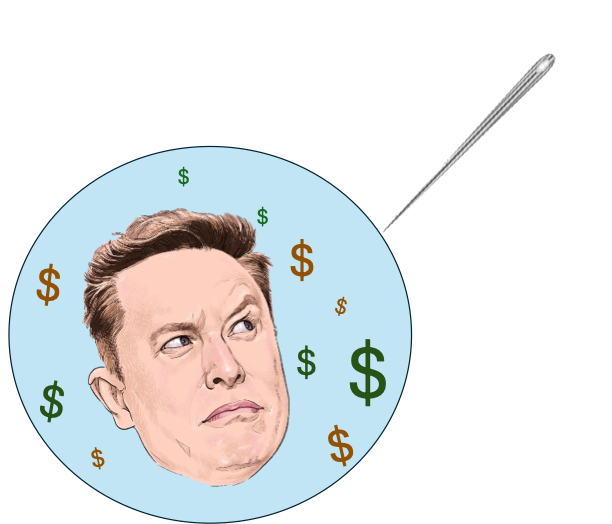Updated: Mar 10, 2022
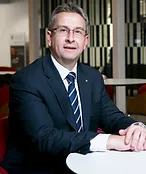
It’s not often you get an email from the CEO of the Chartered Banker Institute. I sat up straighter in my chair to read it. Simon Thompson was looking for an editor for the upcoming Green and Sustainable Finance course book, edition four.
I was completely amazed and honoured that he thought I’d be a good fit! Obviously I accepted in a heartbeat. And I threw my heart and soul into it. Probably a bit too much for poor Simon who found perfectly brilliant sections of his work completely re-written in my short-tempered voice.
Over the next few months, as you can imagine, I learned so much about green and sustainable finance that I feel like my brain grew bigger than my head. I also got to know Simon. Who it turns out, is an absolute legend.
Here is my interview with the hero that is Simon Thompson:
Q: You’ve written several courses and now a book about green and sustainable finance … is there anything else that I’ve missed?
The book: Green and Sustainable Finance: Principles & Practice is now in its 3rd edition, but you’ve very modestly omitted to say that there were substantial contributions from many others, including yourself!
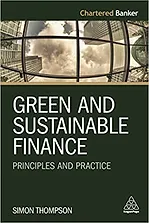
And the course it was originally written to support, the Certificate in Green and Sustainable Finance, is now available in 40 countries, which I’m really excited about.
I chair the UK’s Green Finance Education Charter initiative, which brings together 12 leading professional bodies: accountants, actuaries, bankers, investment managers, insurers, treasurers and others to build the capacity and capabilities of our professions to support a mid-century net zero transition.

Also, I’ve designed and just released the official Green Finance Tartan to mark COP26 and raise funds to support young people from disadvantaged backgrounds seeking careers in finance. See: www.charteredbanker.com/centre-for-responsible-banking/green-finance-tartan.html – look good and do good!
Q: What is your sustainable journey? Were you always like this?
I grew up near Aberdeen in the 1980s during the peak of the North Sea oil boom. It’s a beautiful part of the world – mountains and sea – and of course the oilrigs themselves were far offshore. While at school I didn’t understand or think about (and we weren’t taught) about climate change and the environmental impacts of fossil fuels.

In 1993 I went to Poland to teach English near Katowice – the heart of the Polish coal and steel sector. A wonderful experience in many ways, but my first sight of Poland was waking up on the long-distance coach to the sunrise above the steelworks, clouded by smoke and smog.
When the wind blew in the wrong direction, the pollution blew straight into my windows, and after a day in the city the coal dust in the air was under your fingernails and in your clothes. Forests and lakes were dead. That was when I first started to realise the dramatic and devastating impacts of the high carbon world we had created and we (are) still building.
In 2018 I was at COP 24 in Katowice which, by one of those amazing coincidences in life, was held on the very site my coach pulled into in 1993. Much changed, of course – the coal mine was now a museum – but it very definitely made me reflect on what I’d seen 25 years earlier and remember why continuing to support sustainability is so important.
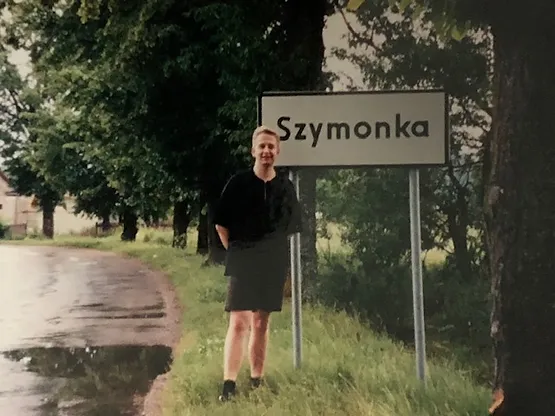
Q: How worried are you about the climate crisis? Do you think about it every day?
Yes – both personally and professionally. I’m concerned by the environmental and societal impacts of climate change, of course, but also very interested potentially in the interaction between the environment, business and finance, and society and trying to understand how we can positively align all three.
Q: You mentioned to me once that you wouldn’t buy a house close to water, how else has the climate crisis changed your behaviour?
Well, not close to the sea or a major river because of the flood risk. Although at the back of my mind is learning several years ago that the last time atmospheric concentrations of CO2 were at current levels (some 3 million years ago) sea levels were 20+m higher than they are today. I’d love a sea view, but not the view of the sea in my living room!
We’re doing what we can at home to be more climate positive and reduce our environmental impact, although very much in the context of a first world approach. Driving an electric car, taking the train rather than flying, eating a lot less meat, etc. Every little helps, but I’m very well aware it’s nowhere near enough.
Do you think that finance professionals know enough about green and sustainable finance? Or nearly enough?
There are some incredible green finance/climate/sustainability specialists working in our sector in both public institutions and the private sector. But a very small number – and even doubling, quadrupling or increasing that number tenfold won’t make a significant difference.
To reach the point where, in Mark Carney’s objective for the COP 26 Private Finance Strategy, “… every professional financial decision takes climate change into account …” then every finance professional needs to develop and apply a knowledge and understanding of green and sustainable finance to the extent appropriate for their role.
So that what we currently view as best practice in terms of incorporating green finance and sustainability into lending and investment decisions and other financial activities becomes standard practice.
Q: Finance has been a bit slow to step up, why do you think this is?
Finance as a whole, yes – but not all financial institutions. On the banking side, think about Ecology and Triodos, for example – although these and others are, I admit, small, specialist institutions. And despite the very good work being done by alliances such as GFANZ, with more than 160 major financial institutions as members, we need to remember that there are thousands more institutions that are not members.
There are perhaps 3 reasons why finance is only just beginning to align with the objectives of the Paris Agreement, the UN SDGs and sustainability more broadly:
- The lack of robust global carbon pricing – until we properly price the externalities involved, we won’t shift the risk/return paradigm sufficiently, and rapidly enough;
- The need for policy and regulatory stability to support longer-term, patient deployment of capital to support low carbon technologies and infrastructure, and firms and sectors in transition; and
- The lack of capacity and capability across finance to embed sustainability considerations into all levels of decision-making in all financial institutions, everywhere.
Q: Do you think finance professionals believe that investments can do good and do well? Or do you think they secretly doubt it?
I believe – and I see – that the great majority of finance professionals go to work every day wanting to do their best not just for themselves and their employer, but for their customers and communities too. The ‘greed is good’ type does exist, but in very, very small numbers.
What the Global Financial Crisis taught us, though, is that when finance professional lack the knowledge and skills required, even good intentions can lead to bad outcomes.
And I do worry about this in the context of green and sustainable finance, as without knowledge of climate and environmental risks, impacts and opportunities, how can individuals make good strategic, investment and lending decisions?
Q: What do you think of banks who give to charity but continue investing in fossil fuels?
I’m not going to give you the easy, ‘right’ answer here, as I think there is genuinely a lot to unpick in this.
If financial institutions give to environmental charities but otherwise proceed as normal and try to present themselves as ‘green’ then that’s greenwashing and should be called out.
A successful transition to net zero doesn’t just rely on investment in new clean, green sectors and technologies, though. Much more important is finance and investment to support the transition of existing sectors and firms dependent on high carbon business models to more sustainable, low-carbon alternatives – ideally following a Paris-aligned transition pathway. We’ve built our whole way of life on fossil fuels since the industrial revolution, and the transition to net zero will impact every economic activity, every economic entity.
We absolutely shouldn’t be continuing to invest in fossil fuels, but we will need to invest to help sectors and firms reliant on fossil fuels transition away from them.
I see this as a good thing, provided all concerned are honest and open about emissions and other impacts. The problem too often comes when such transparency, especially around continued environmental harms, is lacking.
Plus, we must be mindful of the social consequences of rapidly withdrawing funding from companies and sectors when a town, region or country is heavily dependent on them – we need to support a just transition or will lack the support needed for a successful net zero transition.
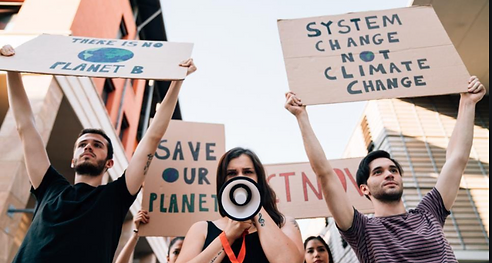
Q: How prevalent is greenwashing?
It’s becoming ever more prevalent, I’m afraid – not surprisingly, given the growth of green and sustainable finance (especially investing) and the green and sustainable economy more generally.
Despite some egregious examples – some of which you’ve drawn attention to through your blog – I feel the great majority of greenwashing is inadvertent rather than deliberate, however. Sure, there are some firms and financial institutions who will deliberately market ‘green’ products, services and funds that not this at all. But the bigger problem for me is the lack of awareness, knowledge and professional scepticism that leads to greenwashing because those involved in the investment and marketing chains simply don’t understand the often very complex and interconnected issues involved.
And, as the market grows, but we fail to keep pace by educating and training the accountants, bankers, lawyers and many other professionals needed to support it, greenwashing will I’m afraid increase.
Q: What does every finance professional need to know?
I could give you a long list of topics here, but I won’t.
Because there’s one thing above all that every finance professional needs to know, and that is that they can make a difference.
It doesn’t matter if you’re the CEO, CFO or a new graduate in your first week on the job. We can all make a difference through our words and actions if we choose to. Just as you do through your blog and writing!
Check out the Chartered Banker Institute’s Green and Sustainable Finance course here



